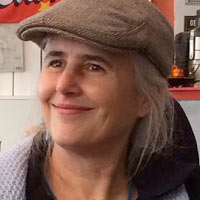
When Sarah Ensor was invited to open the Center for Ecology and the Environment (CEE)’s 2022 Fall Symposium, she accepted with a disclaimer: “What I would have to say as a literary scholar, environmental humanist, and queer theorist, would undoubtedly sound like it was coming out of left field,” joked Ensor, a Nelson affiliate and assistant professor of English, in her opening remarks. “And so I’ve come to think of these remarks as ‘a geography of left field.’ ”
But Ensor’s talk was more of a line-drive, as it showcased the breadth of ecological research happening on the UW–Madison campus. Held twice each year, the two-day CEE Symposium features a keynote address from a prominent researcher and gives early-career faculty from the UW’s ecology community the opportunity to highlight their expertise. This year, nearly 300 learners attended either in-person or virtually.
Ensor was one of four UW–Madison faculty who spoke at the symposium. The lineup was particularly interdisciplinary, including talks from Ensor; Nisa Karimi from the botany department who spoke on African Baobab pollination; Jess Hua from the Department of Forest and Wildlife Ecology who discussed disease in the face of environmental change; and Olaf Jenson from the Center for Limnology who analyzed the sustainability of the world’s largest fisheries.
This fall’s visiting researcher was Mercedes Pascual, a professor in the University of Chicago’s Department of Ecology and Evolution, who gave a keynote talk on each day of the symposium. Pascual is a theoretical ecologist interested in the temporal and spatio-temporal dynamics of ecological systems, from populations experiencing the spread of pathogens to large communities of interacting species in ecosystems. Her research focuses on complex systems in ecology and epidemiology to understand and predict patterns of variability and their connection to structure and scale.
The Fall Symposium kickstarted the stretch between Thanksgiving and winter breaks, with its first day of talks on Monday, Nov. 28. Sean Schoville, the center’s director, opened the event, then CEE researcher James Crall introduced the day’s lineup, which started with Ensor and Karimi and concluded with Pascual’s first talk, “The Structure of Hyper-Diversity and Niche Emergence in Host-Pathogen Systems.” Symposium co-organizer Wendy Turner opened day two, introducing Hua and Jenson before Pascual closed the event with her talk, “Polarization in the Science and Communication of Climate and Infectious Diseases.”
Both days were recorded and are available for viewing online — and save the date for the CEE Spring Symposium, coming up May 1–2, 2023.